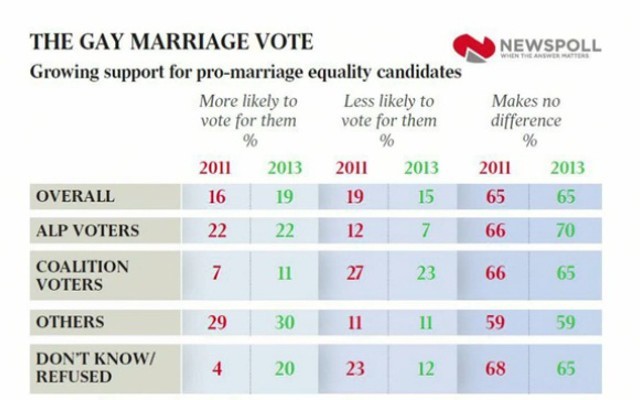Swinging voters’ attitudes to gay marriage have shifted over the past two years, with the proportion “more likely” to support a pro gay marriage party or candidate up from 4 per cent to 20 per cent. The proportion “less likely” went down from 23 per cent to 12 per cent.
Research conducted by Newspoll for the Marriage Equality Movement this month found Australians more likely to support the party or candidate that supports a same-sex marriage bill (19 per cent) now outnumber those less likely (15 per cent), in a reversal of the 2011 result.
It made no difference for 65 per cent of respondents.
Twenty-two per cent of ALP voters polled said they were more likely to support a pro marriage equality party or candidate — unchanged since 2011 — while 7 per cent said they were less likely, down from 12 per cent.
Coalition voters were less keen, with 11 per cent more likely — up from 7 per cent — and 23 per cent less likely, down from 27 per cent.
The issue is most important to those aged 18-24, of whom 51 per cent say support will make them more likely to vote for a candidate or party, compared with 7 per cent less likely.There has also been a significant increase in the numbers who say it is likely that a law allowing same-sex couples to marry will be passed within the next few years — up 16 points from 56 per cent in 2011 to 72 per cent.
Those who intend to vote for the ALP, or for independents or Greens, are most likely (77 per cent) to believe a law allowing same-sex couples to marry will be passed, compared with 69 per cent of Coalition supporters and 53 per cent of swinging voters.
Of voters aged over 50, 75 per cent say change will happen, compared with 70 per cent of those aged 18-34.
Newspoll chief executive Martin O’Shannessy said there was more gain than pain for Kevin Rudd by shifting his support behind gay marriage, with only small numbers of Labor voters indicating they would vote against the party if it pushed for gay marriage.
Newgate Communications partner Feyi Akindoyeni, who analysed the shifts between 2011 and this year, said they reflected global trends. She said that while it was not a core election issue, more people accepted that same-sex marriage was a part of modern life and an equal rights issue.
“The polling in 2011 was accompanied with focus groups. An interesting finding was that even those who oppose it wouldn’t lose any sleep over it if they woke up one morning to discover the laws had been changed. Most Australians like to let others get on with their lives,” she said.
“The poll shows there is more to be gained politically than lost by both parties — (the seats of) Brisbane, Hasluck, Melbourne and Perth for example.”
Author: Patricia Karvelas
Publication: The Australian
Date: 14 August 2013

